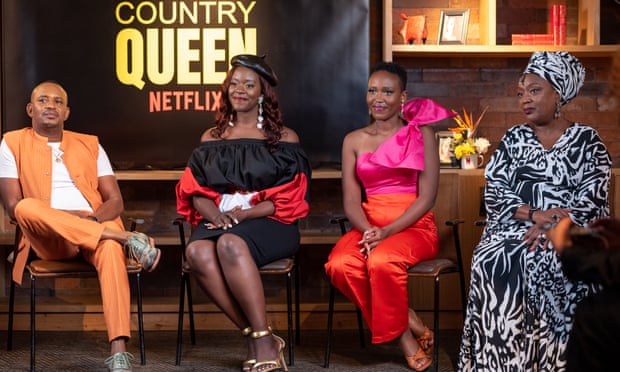Kenya’s first homegrown Netflix series, the family drama Country Queen, has its premiere on Friday, marking the beginning of a significant investment in African film by the streaming company.

Shot in English, Swahili and a mix of other local languages, the series features a female lead character and chronicles the lives of ordinary Kenyans fighting against corporate power and land grabs. It explores urban and rural Kenya through characters intertwined by love, betrayal and conflict.
“We want to show – not just tell – how committed we are to making sure Kenyan stories find a place to shine on a global stage,” said Nkateko Mabaso, Netflix’s director of licensing in Africa. Netflix has stepped up its investment in African films and TV series, and signed a memorandum of understanding with Kenya earlier this year to build up the country’s talent and production capacity.
An expectant audience has mostly welcomed the series as a step towards a more nuanced portrayal of the country and its people on screen. “The global perspective of who we are is still very narrow. We’re known for being runners and having great wildlife but we’re so much more than that and I’m excited to see a deeper depiction of modern Kenya and a shift in perspective,” said Maria Omare, 33, who works in the non-profit sector.
According to the series producer Kamau Wa Ndung’u, pre-development research showed that Kenyans wanted to see a wider breadth of their experiences depicted, to better reflect their realities. “People were tired of everything they see being glamorous,” said Ndung’u. “The feeling was that life doesn’t work like that – there’s always the glamour and the gloom.”
Vincent Mbaya, the series director, said: “We are so used to seeing other people on our screens, so I really hope this translates into a celebration of who we are, a celebration of our culture, our languages and our personalities. I know it’s just a scratching of the surface of the stories we tell about ourselves.”

Country Queen centres on the character of Akisa Musyoka, an ambitious Nairobi event planner, who pushes the boundaries of society’s expectations of women. “We had to be confident in the characters we were writing,” said Lydia Matata, one of the writers.
“Women should be allowed the space to be complex and imperfect – going against the grain that requires them to be 100% likable,” she said.
Many Kenyan films and TV programmes have been funded by international development organisations over the past decade, skewing local programming towards “edutainment”. Kenyan film-makers welcome the shift away from that. “It was really freeing to be able to write characters that don’t have to be a public service announcement for anything. To know that they are just on their own journeys and that even if they go to uncomfortable places, we have to accept that,” said Matata.
The industry has faced harsh content restrictions. In 2018, Kenyan film-maker Wanuri Kahiu’s lesbian romance, Rafiki, was banned by the Kenya Film Classification Board for “promoting homosexuality”.
The actor Arthur Sanya, 40, who has worked in the industry for more than 12 years, said film-makers have been not been free to delve into certain issues because of such bans. “This could be a defining moment in terms of Kenyan shows because it gets into themes that haven’t been fully tackled before, like love, land-grabbling, corruption,” he said.
Prof Kimani Njogu, of the Creative Economy Working Group, said the restrictions had made it difficult for film-makers to take risks. “It stifles stories that should be in the public domain and perpetuates a certain conservative view among the public about what is allowed and not allowed – in film and in society.”
Njogu noted that even though the Kenyan constitution protected artistic freedom, many film-makers were reluctant to challenge regulatory decisions to avoid drawn-out court battles.
Aspiring film-makers in Kenya face formidable barriers; it can be tough to get funding, and there are always concerns about projects’ profitability, said Ndung’u. It took more than five years to get Country Queen off the ground, with years spent looking for investors.
However, streaming platforms such as Netflix are a gamechanger, and their use has grown in Kenya over the past few years, spurred by faster internet speeds and better mobile coverage. Creators are capitalizing on their ability to distribute and monetise content using online platforms, allowing a new generation to make a living in the sector and bypass the industry’s traditional “gatekeepers”, according to a 2021 Unesco report.
“The barriers [to] entry have reduced. Production and viewing are now more democratized and audiences are able to produce and follow the content they’d like outside of legacy institutions,” said George Gachara, a creative industry entrepreneur with the Heva fund.
Netflix is looking to increase its Kenyan subscriber base and launched a free plan for Android phone users in 2021.
“Our markets are young, our populations are growing and we are rapidly urbanizing, so it makes sense for these platforms to have a strong, long-term African strategy,” said Gachara.
But even as the industry makes promising strides, players say that the government could do more. “The private sector is trying because we have one of the most advanced film industries in the region and on the continent. What we need is for the government to make it a priority sector, to de-risk investment, encourage film production, have intelligent licensing and support film-making education,” said Gachara.




